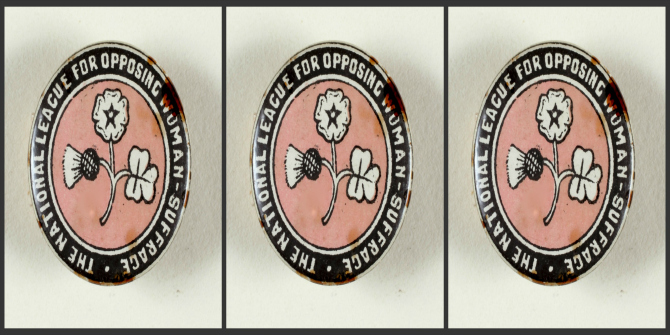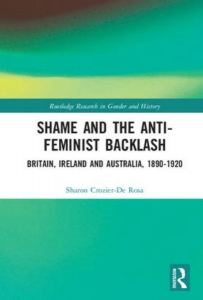In Shame and the Anti-Feminist Backlash: Britain, Ireland and Australia, 1890-1920, Sharon Crozier-De Rosa shows that as different ‘entangled anxieties’ surrounding womanliness, patriotism and imperial authority emerged in these three nations, shame became both a fear and a political weapon for the women who opposed their own enfranchisement. The book is an invaluable contribution to transnational history, the history of emotions and the feminist historiography of politics, writes Jane Haggis.
If you are interested in this book review, you can read an LSE RB interview with Sharon Crozier-De Rosa here, in which she discusses the colonial and transnational dynamics of anti-suffrage movements, women’s militancy, her archival research in The Women’s Library and the continued significance of shame to understanding feminism today.
Shame and the Anti-Feminist Backlash: Britain, Ireland and Australia, 1890-1920. Sharon Crozier-De Rosa. Routledge. 2018.
Why would educated, highly articulate middle-class white women actively oppose their own enfranchisement? This is the key question Sharon Crozier-De Rosa asks in her book, Shame and the Anti-Feminist Backlash. In a nutshell, her response is: because of shame, an emotion anti-suffrage women activists both feared and used as a political weapon against their unruly sisters. The pro-suffrage campaigners posed a visceral threat to the gendered emotional regime underpinning the British empire’s social and moral order, a threat that risked the very coherence of ‘woman’ as a social category. Emotion thus assumes centre stage in this vivid analysis of political struggle, where nationalism, imperialism and gender interweave to generate powerful ‘entangled anxieties’ (8) around womanliness, patriotism and imperial authority.
Debates over female suffrage raged around the world during the period 1890-1920. Imperialism framed these debates as European empires continued to dominate world politics even as nationalism and anti-colonialism grew in strength. Crozier-De Rosa takes three case studies – Britain, Ireland and Australia – and uses a transnational analysis, based primarily on anti-suffrage magazines and journals, to articulate each national site through a common imperial formation.
Crozier-De Rosa draws the three case studies together by documenting how nation and nationalisms intersected with an imperial gender order that coded the nation in terms of male honour and chivalry. The moral responsibility of ‘true womanhood’ was to uphold male, and hence national, honour. Female suffrage, the book argues, threatened the emotional underpinnings of the nation and the gender order by threatening men’s prerogative to protect and defend women. Patriotic women, whether British, Irish or Australian, had a vested interest in the manliness of the nation to maintain their sense of womanliness. The book explores how shame and its synonyms, embarrassment and dishonour, articulated all three imperial sites of anti-suffrage struggle differently. The result is a history that turns, in compelling detail, on paradox, contradiction and irony.
 Image Credit: Badge, National League for Opposing Woman-Suffrage, 1910-1918 (LSE Library No Known Copyright Restrictions)
Image Credit: Badge, National League for Opposing Woman-Suffrage, 1910-1918 (LSE Library No Known Copyright Restrictions)
The importance of nationalism to Crozier-De Rosa’s analysis is reflected in her naming of anti-suffrage activists as ‘patriotic women’, identifying their sense of themselves as the moral guardians of the nation. Chapter One looks at the British case and sets out how the militant, sometimes violent, public campaigns, waged most notably by the Women’s Social and Political Union (WSPU), disrupted both the physical and emotional ‘separate spheres’ ideology of the Victorian imperial order. In the rhetoric of anti-suffrage women activists, violence, such as slashing Winston Churchill with a dog whip, unsexed the feminist women themselves and ‘shamed British womanhood’ (203) as it dishonoured, by extension, all men. In the words of Maria Corelli, the celebrity author and fierce anti-suffrage polemicist, their antics were ‘a scandal to the nation’, making imperial Britain ‘a laughing-stock to the rest of the world’ (39).
Gender and emotion were central to Britain’s imperial status, as Chapter Three outlines in its discussion of British anti-suffrage women’s embarrassment for Australian women’s pretensions to offer a model for the homeland after the latter won suffrage in 1902. A far-distant junior nation’s experiment in reworking codes of national honour were irrelevant to the superior task of defending the virtue of a world empire. To British patriotic women, Australian women were an embarrassment to themselves. For Crozier-De Rosa, the efforts of British anti-suffrage women to shame Australian women reveal the ambiguity of using shame as a political weapon. If the intended target does not recognise the shame, the political effect is greatly diminished. Australian women – anti- and pro-suffrage – did not find themselves or their country embarrassing. Although the patriotic Australian Women’s National League (AWNL) found suffrage unsettling, Crozier-De Rosa argues that they reinvented their patriotic duty by educating the women voters of Australia to defend British values and hence the empire. Patriotic British women’s attempts to shame Australians or radical suffragist women at home were deflected back on to themselves as they suffered the anxieties of worrying about the dishonour of the nation and the potential harm to the code of chivalry that underwrote men’s willingness to defend and protect women.
For Irish women activists, the conundrum posed by female suffrage was very different to either Britain or Australia. ‘Reversing the Shame of British Colonisation’, the title of Chapter Two, indicates Irish women’s dilemmas regarding patriotism and suffrage: was suffrage central to the struggle for national independence or a post-independence agenda? According to Crozier-De Rosa, both feminist nationalists and nationalist feminists agreed that colonial rule deeply shamed Irish men. The difference lay in their respective analyses of contemporary gender regimes. For the feminist-nationalist Irish Citizen, suffrage promised Irish women an equal role in the political struggle with their men. Nationalist feminists, writing in Bean na hÉireann, argued instead that breaking down the conventions of the British gender order would simply make Irish women complicit in the humiliation of their men, thus shaming themselves also. Ultimately, Crozier-De Rosa argues, Irish women of both factions upheld the convention that it was up to men to restore the national honour and pride. To do otherwise risked unmanning the nation and unsexing its women. Ironically, Crozier-De Rosa concludes, both factions of Irish women despaired of the servility of Irish politicians at Westminster, but ultimately remained committed to an emotional gender order that viewed women’s political activism as potentially placing men’s honour and national pride at risk.
The final three chapters of the book focus on the impact of World War One on these battles over suffrage and the nation. Patriotic women, whether enfranchised Australian women, British or Irish, were often disconcerted by the exigencies of war. What was the role of women in wartime? How could women participate in war – a quintessential arena of masculine honour – without shaming the nation of men? Could women be courageous? What if men were not rising to the call to defend the nation? Crozier-De Rosa explores these questions in terms of British anti-suffrage women’s distrust of the amnesty called by suffrage feminists and their participation as nurses and drivers in the warzone as well as their staunch rejection of violence by women as degrading. For Australian patriotic women, the debate over conscription called into question not only the capacity of women voters to properly appreciate their patriotic duty, but of Australian men to defend the nation and white imperial masculinity. A campaign of shaming Australian men who did not enlist was pursued by AWNL, a strategy their patriotic British sisters regarded as unfeminine and at risk of destabilising the emotional regime underpinning the nation and empire. Irish women activists, galvanised by women’s participation in the 1916 uprising and the collective memory of a warrior past, argued they were as emotionally capable as their men of being courageous and had equal right to take up arms to defend women’s virtue and the nation’s honour.
In Crozier-De Rosa’s analysis, the intersection of indigeneity and colonialism accords Irish patriotic women the most progressive role in challenging the emotional status quo of the gendered nation. The concluding chapter, however, draws attention to how the violent woman, represented by the 1916 freedom fighter Constance Markievicz, is, by the 1990s, memorialised in ways that affirm the masculinity of the nation and secret away the shame of the violent woman. Similarly, in Britain, the radical violence of Emmeline Pankhurst is re-embodied in the figure of the true patriot rather than the shameful feminist. Thus, Crozier-De Rosa’s analysis hints that while the patriotic anti-suffrage activists may have lost the battle, perhaps their vigilance in policing the emotional regimes of the nation by deploying shame, despite its ambiguities, won the war in terms of gendering the nation.
Read this book to see how studying the losers of history does not necessarily end up in a history of losers. Anti-suffrage women are revealed to be a fascinating element in a complex battle over the idea of who is the nation: one we are still engaged in today through discussions around gender, race, class and imperialism. As a whole, Shame and the Anti-Feminist Backlash makes an invaluable contribution to transnational history, the history of emotions and the feminist historiography of politics, not least through its ambition not simply to pursue a history of emotions or add emotion to an existing history, but, to paraphrase Johannes Lang, to incorporate emotion into new histories.
Jane Haggis is an Associate Professor in the College of Humanities, Arts and Social Sciences, Flinders University, Adelaide, South Australia.
Note: This review gives the views of the author, and not the position of the LSE Review of Books blog, or of the London School of Economics.


 Find this book:
Find this book: 



